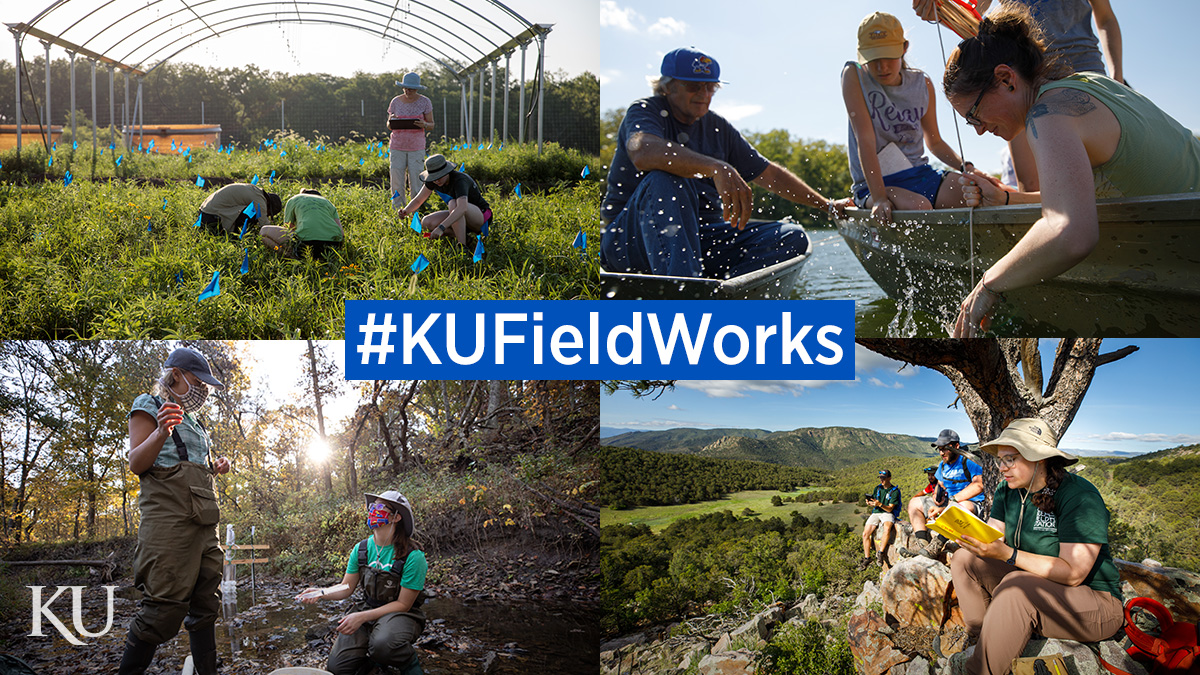#KUFieldWorks: Monitoring endangered humpback chub fish in the Grand Canyon
University of Kansas researchers conduct fieldwork in prairies, rivers, streams and mountains. The #KUFieldWorks series follows researchers on their fieldwork adventures.
Q&A with Ecology & Evolutionary Biology Professor Jocelyn Colella
LAWRENCE — Amid windy conditions and helicopter rides in the Grand Canyon, University of Kansas researcher Jocelyn Colella recently conducted fieldwork on endangered humpback chub fish populations.
The Robert W. & Geraldine Wilson Assistant Professor of Ecology & Evolutionary Biology and Assistant Curator of Mammals at KU’s Biodiversity Institute conducted the research with the U.S. Geological Survey's Grand Canyon Research Center, U.S. Fish & Wildlife Service and the Arizona Department of Fish & Game in the Little Colorado River.
The team of biologists sought to understand how humpback chub populations have changed over time. Their goal? Preventing the collapse and extinction of the species.
Fieldwork provides invaluable insights about real-world environments and processes, expanding and reinforcing what researchers learn in classrooms, labs and collections. KU faculty, staff and students across a spectrum of disciplines are taking their inquiry directly to rivers, prairies, dig sites, glaciers, islands, burial grounds and more this summer. Through the #KUFieldWorks series, we'll join them on their adventures.
What methods, approaches and experiments did you use to answer your research question?
We collected live fish in hoop nets, measured, scanned and tagged them. This trip was special because we conducted a translocation, which means we collected and moved hundreds of young fish upriver. Over two weeks, we added fish to barrels suspended in the middle of the river. At the end of the trip, we counted, tagged, scanned and measured all the baby fish, put them in a giant bucket and helicoptered them upriver to better habitat. This will give them a higher chance of survival and boost population sizes over time.

Jocelyn Colella holds a humpback chub fish.
Why does your study matter to your field or to society?
Now considered endangered, humpback chubs were historically distributed throughout the Colorado River basin. Construction of the Glen Canyon Dam made the main channel of the Colorado River less suitable for chubs — too cold and clear, as chubs prefer warm, turbulent water. In response, the humpback chub range has been reduced to a few small tributaries, including the Little Colorado River. Invasive species — including carp, green sunfish, and plains killifish — also prey on baby chubs. By monitoring population sizes and genetic diversity and conducting strategic translocations of young fish, state and federal biologists aim to prevent the extinction of the species.
What do you enjoy most about being in the field?
It’s a valuable reset for me, mentally and physically. It helps remind me of what I love about biology — the animals, plants, rocks, beauty — and what really matters in life. It is also a nice physical break from sitting in front of my computer screen and reminds me that the world keeps turning even if I don't check my email for a bit.
What are some memorable (funny, scary, surprising) moments from the field?
We had two days of 60 to 80 mph winds. The first day of wind broke four of our group's six tents, which required us to get creative with sticks and duct tape to keep lodging standing for another week and a half.
This was also a cool trip because most of the field crew was women. Our team included women from all organizations involved, even our helicopter pilots. As a young woman in science, it's awesome to see other women — young and old, volunteers and employees, from a variety of cultural and scientific backgrounds — as leaders in the field.

The team conducted its research in the Grand Canyon.
How does fieldwork complement the work you do elsewhere?
It's always good to be well-rounded, right? As a mammologist, it's fun to get into the field with other “ologists” to see how methods differ and complement each other. Compared to mammal trapping, fishing is easy. We would regularly catch more than 50 fish in a single net, which would never happen for mammals.
When is fieldwork frustrating, challenging or overwhelming?
When is it not? There is no cell reception at the bottom of the Grand Canyon. We communicated with headquarters in Flagstaff using tweet-sized messages on a satellite communicator, but even then, some messages don't come through. We had to extend our stay last-minute because helicopter crews were busy fighting fires. It's important to be flexible — and to pack emergency snacks, just in case.
